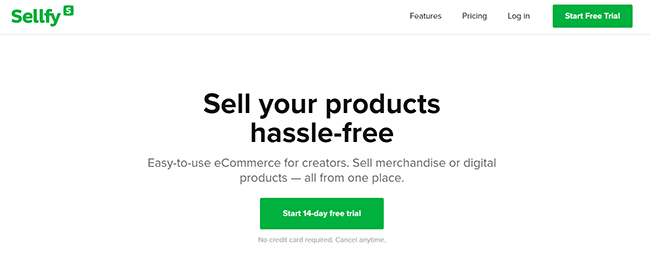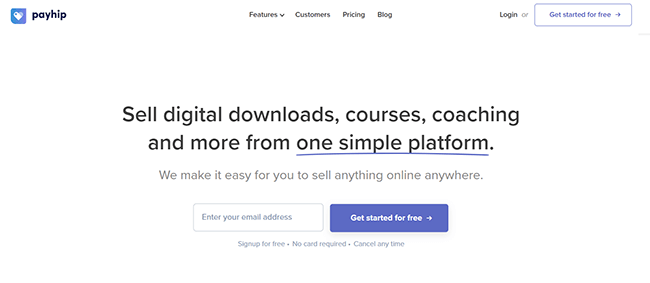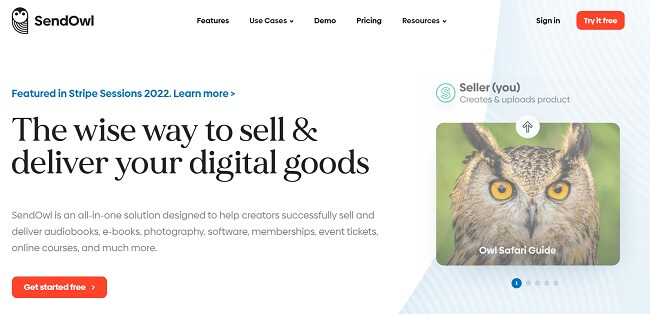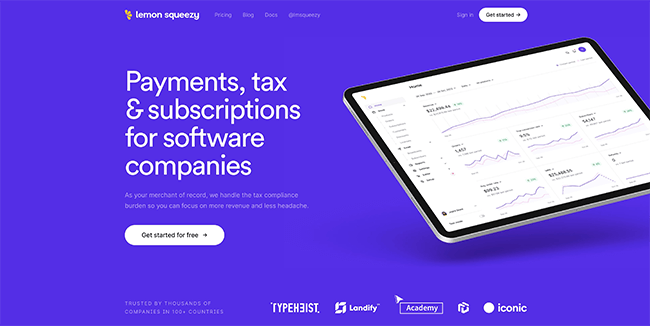8 Best Gumroad Alternatives & Competitors (2024 Comparison)
Not sure if Gumroad is the right platform for your ecommerce business? These Gumroad alternatives might be a better fit.
Gumroad is a simple ecommerce platform & marketplace that appeals to creative entrepreneurs like musicians and artists—but it isn’t perfect.
There’s no getting around transaction fees on Gumroad, and it doesn’t give you a lot of choices when it comes to customizing your store design.
If these factors are a dealbreaker for you, don’t worry—there are plenty of other platforms like Gumroad out there that don’t have these same drawbacks.
We’ll be reviewing our favorites in this roundup of the best Gumroad alternatives and competitors. Below, we’ll share each of our top picks alongside details about their key features, pros and cons, and pricing.
The best Gumroad alternatives & competitors – TL;DR
Sellfy is the best Gumroad alternative for most users. You can sell digital products, physical products, subscriptions, and custom merch. The platform is extremely easy to use. Embed buy now buttons on your site or create a full store. Print-on-demand included.
Podia is another solid option, particularly for those wishing to sell courses & other digital products. However, this platform isn’t well suited to selling physical products.
Both Sellfy and Podia offer zero transaction fees on paid plans.
#1 – Sellfy
Sellfy is our top pick for the overall best Gumroad alternative. It’s another easy-to-use platform built for creators and is suitable for all kinds of stores.

You can sell pretty much anything with Sellfy: digital products, subscriptions, physical products, and even custom merchandise.
The built-in print-on-demand feature lets you upload your own designs to Sellfy products and add them to your store. When you make a sale, Sellfy prints and ships the order directly to the customer for you, then bills you the base cost. There’s no need to purchase stock upfront.
Sellfy’s also jam-packed with useful marketing and sales features. There’s an intuitive store builder, online shopping cart, discount code engine, email marketing tool, embeddable buy buttons and product cards, and more.
You have more customization options than you do with Gumroad. And unlike Gumroad, Sellfy doesn’t charge any transaction fees regardless of the plan you sign up for (but you will have to pay a monthly subscription fee).
All in all, Sellfy’s a fantastic platform—and much better value than most of its competitors.
The only thing to watch out for is the sales limits. On the entry-level plan, you can only have up to $10k in sales per year. Even on the highest-price plan, you’re still capped at $200k, so it might not be the best choice for large businesses with six-figure turnovers.
But for smaller businesses, it’s ideal.
Key features
- Sell physical or digital products
- Print on demand tool
- Memberships and subscriptions
- Store editor
- Customizable themes
- Coupons and upsells
- Email marketing
- Abandoned cart emails
- SSL
- Integrations
- VAT & tax
Pros and cons
| Pros | Cons |
| Beginner friendly | Sales revenues are capped at $10k to $200k based on your plan |
| Great for creative entrepreneurs | No marketplace |
| Built-in POD | |
| Sell digital products, physical products, and subscriptions | |
| Great selection of easy-to-customize store templates |
Pricing
Plans start from $29 per month. Discounts available if you sign up for 1 or 2 years. A free 14-day trial is available.
Read our Sellfy review.
#2 – Podia
Podia is another great all-in-one ecommerce platform that you can use to sell courses and digital products with zero transaction fees on all paid plans.

Podia is geared more toward digital products. It’s great for selling online courses, as well as subscriptions, and digital downloads—but it lacks the inventory management and fulfillment tools you’d need to sell physical inventory.
That said, it has some next-level features for digital ecommerce businesses and offers lots of functionality that you don’t get with Gumroad—or even most other platforms, for that matter.
You don’t just get the tools you need to sell digital products (like a checkout, website builder, marketing tools, etc.) but also tools to help you create those products.
For example, there’s a fully-integrated LMS and online course builder that you can use to create and host eLearning products. And a Community tool that lets you set up a members-only discussion forum in one click.
From your Communtiy space, members can create profiles and interact with each other through comments and threads. You can set up different topic boards to organize the forum however you want.
Once you’ve built your community space, you can then offer access to it as part of your subscription products. You can even create tiered plans and offer extra benefits to those who purchase higher-priced subscriptions.
For example, you could offer a Basic subscription plan that gives access to your online course; a Silver plan that gives access to your course + additional modules, and a Gold plan that gives access to all of the above plus your members-only forum.
Key features
- Website builder
- Coaching
- Webinar hosting
- Digital downloads
- Email marketing
- Affiliate marketing
- Communities
- Flexible subscriptions
- Online course builder
- Embeds
- Integrations
Pros and cons
| Pros | Cons |
| Powerful community features | Can’t sell physical products |
| Integrated LMS | Hefty transaction fees on free plan |
| Easy to use | |
| All-in-one toolkit |
Pricing
Podia offers a limited free plan that’s subject to 8% transaction fees. Paid plans have zero transaction fees and start from $33/month when billed yearly.
Read our Podia review.
#3 – Payhip
Payhip is an all-in-one ecommerce platform that stands out for its simplicity. It supports all kinds of products including digital downloads, memberships, courses, and physical products.

We really like how easy Payhip is to use. The store builder is fully customizable and makes it easy to set up your store in minutes with no coding required.
Alternatively, if you already have your own website, you can just use the embed feature to connect it to Payhip’s high-converting checkout.
To make your life even easier, Payhip even reports and pays digital EU/UK VAT on your behalf. So no more tax compliance worries!
As far as features go, it has everything you need: payment gateway integration, email marketing, digital product fulfillment, etc. And every plan includes all features—even the free plan. Every plan also comes with unlimited products and revenue.
The only difference is the transaction fees—the more you pay for your monthly subscription, the less you’ll have to pay on each sale.
Key features
- Sell all types of digital products
- Online course builder
- Memberships
- Product & inventory management
- Tax & VAT
- Payments
- Marketing tools
- Store builder
Pros and cons
| Pros | Cons |
| Good UI | No discovery feature |
| Lots of tools in one | All plans subject to transaction fees except Pro |
| Great free plan | |
| All features available on all plans |
Pricing
Payhip offers a Free Forever plan subject to 5% transaction fees. The plus plan costs $29/month with 2% transaction fees, and the Pro plan costs $99/month with zero transaction fees.
Read our Payhip review.
#4 – ThriveCart
ThriveCart is one of the best shopping cart platforms on the market. It helps you to create cart pages and funnels that convert like crazy and provides all the backend ecommerce functionality you need to make sales.

ThriveCart is a great alternative to Gumroad if you’re selling digital products. It includes a basic LMS for courses and supports lots of digital file types.
But its USP is its checkout and funnel-building capabilities. It’s designed to create checkout funnels that get more customers to convert and comes armed with lots of tools to help you do just that.
You can use the drag-and-drop tool to create high-converting one-page, embeddable, and popup carts. Then, use the profit boosters feature to add one-click upsell funnels, subscriptions, free trials, bump offers, etc. to maximize your revenues.
On top of all that, ThriveCart also comes with built-in analytics. The powerful real-time metrics provide intelligent insights that you can use to inform your strategy, like live traffic and conversion rates, lifetime value, average daily revenue, projected revenue, and more.
Other features we like include ThriveCart’s advanced automation functionality and sales tax tool.
Key features
- Funnels
- One-click upsells
- Order bumps
- Templates
- Online courses
- Shopping carts
- Analytics
- Sales tax
- Powerful automations
- Flexible payments (subscriptions, free trials, etc.)
Pros and cons
| Pros | Cons |
| Powerful cart software | High initial cost (no monthly or yearly payment option) |
| Great support | Learning curve |
| Excellent integrations | |
| Powerful joint venture and affiliate marketing functionality |
Pricing
You can purchase a ThriveCart Lifetime Account for a one-off payment of $495 as part of their special offer. Unfortunately, there is no option to purchase a monthly or yearly subscription so you’ll have to be prepared to commit to using ThriveCart for the long-term.
#5 – SendOwl
SendOwl is another Gumroad alternative worth checking out. It’s great for selling digital downloads like ebooks, photography, software, and audiobooks.

What’s great about SendOwl is how easy it is to use. Like Gumroad, its focus is on simplicity. It doesn’t have all the bells and whistles of some other platforms and lacks some key features like a website builder, but its basic ecommerce tools are great.
There’s a powerful checkout, profit-boosting features like upsells and abandoned cart emails, and some built-in marketing features to help you sell more products.
When you make sales, SendOwl automatically delivers the product to the customer. And it keeps your intellectual property secure.
Key features
- Shopping cart
- Checkout
- Fast and secure delivery
- Multi-language and multi-currency
- Flexible payments
- Digital products
- Physical products
- Memberships and subscriptions
- Codes & license keys
- Upsells
- Discounts and coupons
- Cart abandonment emails
- Payment Links
- Email templates
- Embeddable buttons
- Analytics
- Integrations
Pros and cons
| Pros | Cons |
| Powerful checkout | No website builder |
| Great analytics | Support could be better |
| Excellent product delivery |
Pricing
SendOwl offers a free plan (subject to 5% fees on sales). Paid plans start at $19 per month. You can get started with a 30-day free trial.
Read our SendOwl review.
#6 – Lemon Squeezy
Lemon Squeezy is the best alternative to Gumroad if you’re selling software, but it also supports all types of digital products.

Lemon Squeezy comes with most of the tools you’d expect from an ecommerce platform, like a drag-and-drop website builder, integrated checkout, bundles, upsells, marketing tools, and analytics.
And like Gumroad, you can use it to sell things like ebooks, audio, and other downloadable files. But what makes it stand out is its support for selling software—a type of digital file that is usually tricky to deliver.
Once you sell software to a customer, Lemon Squeezy automatically issues a license key to give them access.
We also like that Lemon Squeezy comes with a built-in email marketing solution. You can build email broadcasts and check email metrics without ever leaving your Lemon Squeezy account.
Key features
- Drag-and-drop store builder
- Mobile responsive
- Embeddable checkouts
- Sell software
- License keys
- Sell subscriptions
- Sell digital downloads
- Marketing tools
- Bundles and upsells
- Lead magnets
- Email editor
- Insights
- Tax compliance
- Invoicing
Pros and cons
| Pros | Cons |
| Ideal for software sellers | Transaction fees on all sales |
| Includes email marketing tool | |
| Easy to use | |
| No monthly payments required |
Pricing
Like Gumroad, Lemon Squeezy doesn’t charge a monthly subscription fee. You can use it to build your store and start selling without spending a penny. However, you’ll be subject to a fee of 5% +50c per transaction.
#7 – Shopify
Shopify is the most popular (and arguably, the best) hosted ecommerce platform in the world. It’s a good alternative to Gumroad for serious businesses that want more flexibility and a platform that can scale with them.

There’s a reason tens of millions of businesses around the world use Shopify to power their ecommerce stores. It’s a great platform, with a nice easy-to-use UI, lots of powerful features, a fantastic App marketplace, and good speed, performance, and reliability.
The core of Shopify is the store builder. You can use it to bring your ecommerce vision to life with no coding required. There are hundreds of customizable, world-class themes to choose from, but only 9 of them are free. The good news is even the free themes look great.
Once you’ve chosen your store, adding products to Shopify is a breeze. You have lots of options when it comes to pricing, and it’s easy to manage all your products and orders from Shopify’s neat and tidy backend.
Shopify’s checkout is one of the best around. And it’s performance is great too. Shopify store pages load quickly and are mobile-responsive, both of which help to boost conversion rates and help with SEO.
But my favorite thing about Shopify is how extensible it is. There are thousands of free and paid third-party apps in the Shopify App store, which you can install on your Shopify store in a few clicks to extend its functionality.
There are apps for pretty much everything. Want to add a chatbot to your store? There’s an app for that. Want to start dropshipping? There’s an app for that too. If you can think of it, there’s probably a plugin that can do it.
This makes Shopify second only to WordPress/WooCommerce (which we’ll talk about next) in terms of its versatility and flexibility.
That said, Shopify isn’t perfect either. Our main gripe is that Shopify kind of forces you to use its own internal payment gateway. Other payment gateways are supported, but you’ll be charged additional fees of between 0.5% and 2% unless you use Shopify Payments.
Key features
- Store builder
- Product management
- Order management
- App store
- Hosting
- Domain
- Marketing
- Checkout
- Payments
Pros and cons
| Pros | Cons |
| Great UI | Additional fees if you don’t use Shopify Payments |
| Huge app store | Limited number of free themes |
| Excellent reliability | |
| Broad feature set |
Pricing
Shopify plans start at $5/month and annual discounts available. Get started with a 3-day free trial, then $1/month after for 3 months.
#8 – WooCommerce (WordPress only)
WooCommerce is a WordPress ecommerce plugin. It’s the best Gumroad alternative for anyone that wants to start selling through their existing WordPress website.

The great thing about WooCommerce is how flexible it is. It runs on top of WordPress—the world’s most powerful open-source CMS. As such, there are almost no limits to what you can do with it.
With WooCommerce, you pretty much have complete control over your online store with endless customization options, configurable shipping, etc.
You can set up your landing pages, products, and pricing however you want. Whereas with Gumroad, you’re more boxed in and only have partial control over the way your store looks and works.
And unlike Gumroad, both WordPress and WooCommerce are completely free, open-source tools. So you don’t have to pay anything to use them (but you’ll need to pay for web hosting to make your store accessible through the internet).
Most of the stuff you need to run your store is included in WooCommerce out of the box, like secure payments, checkout software, order and product management, etc. But if something is missing, you can probably find a free or paid extension in the WooCommerce marketplace that does the trick.
For example, the core WooCommerce plugin doesn’t include a booking calendar. But you can just install the WooCommerce Bookings add-on to extend its functionality in one click. Likewise, if you’re hoping to sell subscriptions, just install WooCommerce Subscriptions and you’re good to go.
You get the best of both worlds: a lightweight plugin that isn’t weighed down by a bunch of unnecessary features most store owners will never use, but with limitless extensibility, so you can add features as needed through extensions.
The biggest downside to WooCommerce is that it isn’t as easy to use as a fully-hosted solution like Gumroad. You’ll need to put more work into setting everything up and you’ll probably have to piece together a bunch of plugins to get everything the way you want it.
And because it’s self-hosted, you’ll also be responsible for technical stuff like updates and site maintenance. This is something you wouldn’t have to worry about with Gumroad.
Key features
- Payments
- No-code customization
- Checkout
- Shipping
- Mobile App
- Email marketing
- Coupons and points
- Blog
- SEO
- Upsells and cross-sells
- Facebook Ads
- Third-party marketplace integration
Pros and cons
| Pros | Cons |
| Highly customizable and flexible | Requires more maintenance |
| Lots of extensions and add-ons available | Higher learning curve |
| Complete control and ownership | Must purchase hosting separately |
| Free and open-source |
Pricing
WooCommerce is free to use, but some WooCommerce extensions cost extra. You’ll also need to purchase web hosting for your WordPress site. We’d recommend a Liquid Web Managed WooCommerce Hosting Plan.
Final thoughts
Not sure which Gumroad alternative is the best choice for your online business? Let’s review the main options.
Both of our top picks come with zero transaction fees on paid plans, and you can’t go wrong with either of them:
Sellfy is the best choice for most businesses. It’s a versatile and easy-to-use platform that lets you sell both digital and physical products, as well as subscriptions and print-on-demand merch. And like Gumroad, it’s targeted mainly toward creative entrepreneurs.
Podia is the best choice for online course sellers and a solid option for anyone selling any type of digital product. However, it’s not the right choice if you want to sell physical inventory.
If nothing in this article seems like the right choice for you, you might find something more suitable in our roundup of the best platforms to sell digital products.
Or if you’re only selling memberships, check out these awesome subscription ecommerce platforms for more ideas.
Disclosure: If you buy through links on our site, we may make a commission. This helps to support the running of Startup Bonsai.
